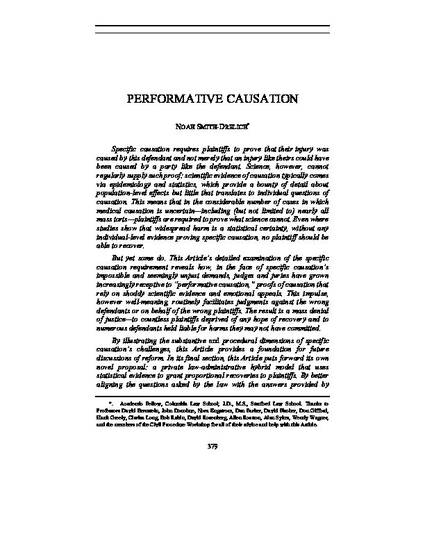
Article
Performative Causation
Southern California Law Review
(2020)
Abstract
Specific causation requires plaintiffs to prove that their injury was caused by this defendant and not merely that an injury like theirs could have been caused by a party like the defendant. Science, however, cannot regularly supply such proof: scientific evidence of causation typically comes via epidemiology and statistics, which provide a bounty of detail about population-level effects but little that translates to individual questions of causation. This means that in the considerable number of cases in which medical causation is uncertain—including (but not limited to) nearly all mass torts plaintiffs are required to prove what science cannot. Even where studies show that widespread harm is a statistical certainty, without any individual-level evidence proving specific causation, no plaintiff should be able to recover.
But yet some do. This Article’s detailed examination of the specific causation requirement reveals how, in the face of specific causation’s impossible and seemingly unjust demands, judges and juries have grown increasingly receptive to “performative causation,” proofs of causation that rely on shoddy scientific evidence and emotional appeals. This impulse, however well-meaning, routinely facilitates judgments against the wrong defendants or on behalf of the wrong plaintiffs. The result is a mass denial of justice—to countless plaintiffs deprived of any hope of recovery and to numerous defendants held liable for harms they may not have committed.
By illustrating the substantive and procedural dimensions of specific causation’s challenges, this Article provides a foundation for future discussions of reform. In its final section, this Article puts forward its own novel proposal: a private law administrative hybrid model that uses statistical evidence to grant proportional recoveries to plaintiffs. By better aligning the questions asked by the law with the answers provided by science, this model offers a promising mechanism for resolving individual questions of causation—as well as a template for how mass torts resolutions can capture the best and guard against the worst features of both private law and public law adjudicatory systems.
Keywords
- specific causation,
- general causation,
- law,
- law and science,
- torts,
- adjudicatory systems,
- medical causation
Disciplines
Publication Date
March, 2020
Citation Information
Noah Smith-Drelich. "Performative Causation" Southern California Law Review Vol. 93 Iss. 3 (2020) p. 379 - 430 ISSN: 0038-3910 Available at: http://works.bepress.com/noah-smith-drelich/3/
